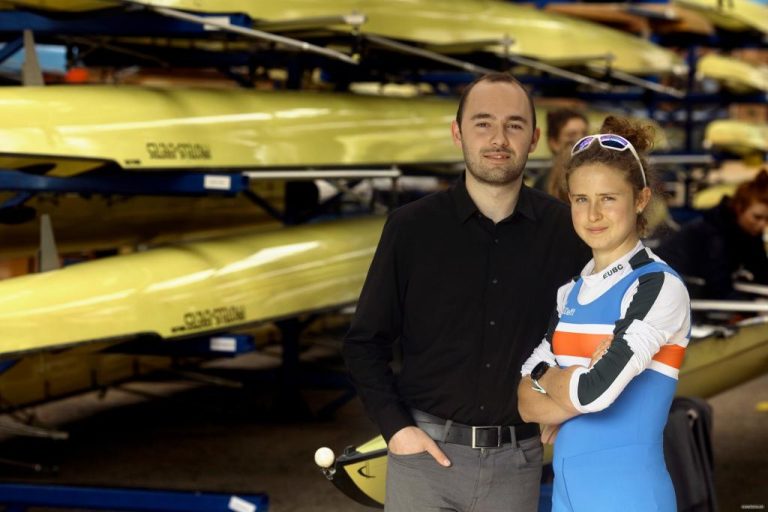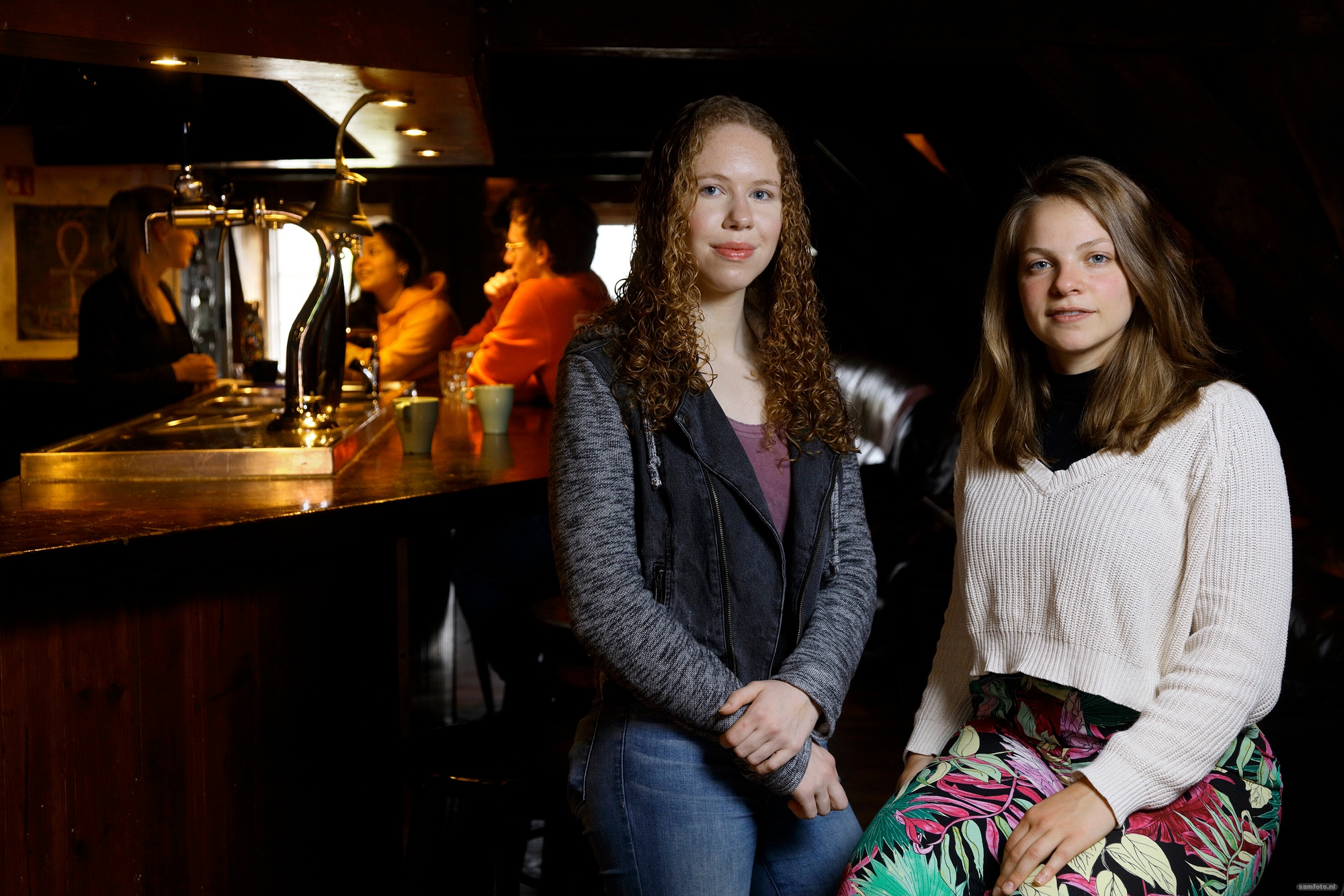What is it like to be an international member of a student association or sport club? The British Susannah Duncan and American Sophia Lieske look back on their first year.
Sophia Lieske (left) together with Charlie Wolters, Vice-President of Sint Jansbrug. (Photo: Sam Rentmeester)
For the first time, last year’s TU Delft introduction week was open to both national and international students. That presented the organising committee Owee and the many social and sport associations with a serious challenge. They welcomed new members not only from Groningen and Tiel, but also from Exeter and Rockville.
Delta spoke with two international students about their first year at a TU Delft association: Susannah Duncan, who joined the rowing club D.S.R. Proteus-Eretes, and Sophia Lieske, who joined D.S.V. Sint Jansbrug.
Ice cream from De Lelie
After her bachelor in mechanical engineering, Susannah Duncan was faced with a choice: do a master in Exeter at the university where she had already been for three years, or undertake an adventure elsewhere in Europe? When someone mentioned the master in sustainable energy & technology, her mind was made up.
“I already knew Delft,” she said. “I rowed during the world championship 2016 in Rotterdam and my parents rented an Airbnb in Delft for that period. After the WC, I stayed on for a few days and thought it was all fantastic. Although that could have been due to the great weather and the ice cream from De Lelie,” she added with a smile.
The story of the American Sophia Lieske is entirely different. She claimed that it was random chance that she ended up studying in Delft. “This is the only place in Europe where I was welcome for a reduced tuition fee given my American grades. Because even though my high school scores placed me in the 98th percentile nationally, they don’t automatically grant you acceptance to European universities.”
For the student of computer science and engineering, who actively participated in the OWee, the introduction week was different to what she expected. “In the United States the introduction period lasts two days and consists mostly of lectures about safety. But on my first day here, I was standing in the Jumbo supermarket, because my OWee mentorts believed it would be better to buy sixpacks since the beer at the Cantus was too expensive.”
‘So special, that would never happen in the United States’
Rather overwhelmed and a few festive evenings later, she registered at Jansbrug. “After I had wrestled my way through the Dutch application form with the assistance of a board member, it appeared that I could not pay the mandatory registration fee. My American bank card was not accepted.” What happened next Lieske ascribes to the open attitude of the Dutch. “A girl I had just met that evening offered to loan me the money. So special, that would never happen in the US!”
Style and mores
Duncan recognises that. “The Dutch are very proud. If they see that you are making an effort to integrate or learn the language, they are happy to help you.” As master student and experienced rower, she could skip the introduction period for freshers at Proteus-Eretes. She found that a shame, “because in that period you learn a lot about the traditions and history of an association”.
It was these traditions, better known as style and mores, that helped the American to get to know many people in a brief period and to learn Dutch quickly. “During the introduction period at Sint Jansbrug, literally every fresher I spoke to went out of their way to help me. For example, they translated the text to the songs we had to sing into English.” Lieske illustrated her development according to the sentence that she learned by heart especially for the OWee. “At that time, the best I could do was, ‘Ik kan geen spreken geen Nederlands,’ [I don’t speak Dutch] now I can speak it a little and understand more and more. I have learned a lot of words that I didn’t really need, though,” she grinned.


Susannah Duncan (right) with Hein Gijsman, Vice-President of D.S.R. Proteus-Eretes. (Photo: Sam Rentmeester)
Distant and reserved
Both Duncan and Lieske noticed that many international students are burdened with the reputation of being distant and reserved. Duncan clarified, “You do have to make a great effort. Luckily, I already knew a lot of Dutch rowing terminology and stories, so conversations happened spontaneously. Nowadays I like watching the TV-series De Luizenmoeder, it is quite difficult to follow because they talk so fast.”
Despite membership of an association demanding a considerable dose of commitment, Duncan advises future international students to join a club. She does have a recommendation to make to the boards of clubs. “Explain clearly to the students what is expected of them. Don’t insist so much about Dutch being required, instead formulate membership as an opportunity to learn Dutch, that sounds so much more positive.”
Home sickness
But associations and clubs are more than just good language schools. Lieske added, “This is the first time that I have been so far away from my family. That has been difficult to bear, but Sint Jansbrug supported me well. It is a strong community that feels like a family. It allowed me to be open. So I told them recently that I sometimes suffer from home sickness. Perhaps I was being naive, but I was surprised to find that I was not the only one wrestling with these feelings. It felt comforting and special to share that kind of uncertainty.”
Duncan is especially impressed by the professionality and commitment with which her fellow members exert themselves for Proteus. “When I rowed at Exeter, we had a single coach for 60 rowers and 5 students who had to teach 200 freshers how to row. You can imagine how high the drop-out rate was.” According to her, students in England are encouraged to work on committees, but students in the Netherlands have the opportunity to devote themselves fully to this. “Here you are even ‘rewarded’ for a year on a board, not only in the form of financial compensation from the university, it also looks very good on your CV.”
Typically Dutch
The two students would like to share some inside information for the next intake of international students. “Dutch people have a WhatsApp group for everything,” laughed Duncan. “It’s true, when I had just arrived, my phone never stopped vibrating!” And watch out when you are talking to three Dutch people, warned Lieske. “As soon as a fourth Dutch person joins them, the spoken language will switch from English to Dutch.” The most important tip? Dive into the Dutch culture, show that you are willing to integrate and enjoy the time that you have here.
Do you have a question or comment about this article?
m.vanderveldt@tudelft.nl


Comments are closed.